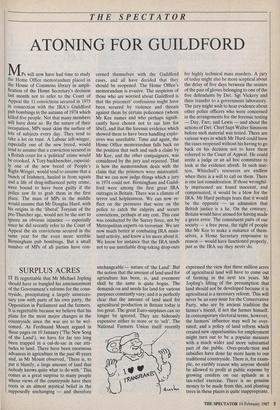THE SPECTATOR
ATONING FOR GUILDFORD
MPs will now have had time to study the Home Office memorandum placed in the House of Commons library in ampli- fication of the Home Secretary's decision last month not to refer to the Court of Appeal the 11 convictions secured in 1975 in connection with the IRA's Guildford pub bombings in the autumn of 1974 which killed five people. Not that many members will have done so. By the nature of their occupation, MPs must skim the surface of lots of subjects every day. They tend to take a lot on trust. A Labour left-winger, especially one of the new breed, would tend to assume that a conviction secured in a British court for a `political' crime would be crooked. A Tory backbencher, especial- ly one of the new breed of People's Right-Winger, would tend to assume that a bunch of Irishmen, hauled in from squats and a life of drug-influenced petty crime, were bound to have been guilty if the police saw fit to grab them in the first place. The mass of MPs in the middle would assume that Mr Douglas Hurd, with his origins in the 'liberal' Toryism of the pre-Thatcher age, would not be the sort to ignore an obvious injustice — especially since he did recently refer to the Court of Appeal the six convictions secured in the same year for the even more terrible Birmingham pub bombings. But a small number of MPs of all parties have con- cemed themselves with the Guildford cases, and all have decided that they should be reopened. The Home Office's memorandum is evasive. The suspicion of those who are worried about Guildford is that the prisoners' confessions might have been secured by violence and threats against them by certain policemen (whom Mr Kee names and who perhaps signifi- cantly have chosen not to sue him for libel), and that the forensic evidence which showed them to have been handling explo- sives was unreliable. Time and again, the Home Office memorandum falls back on the position that such and such a claim by Mr Kee, and the other compaigners, was considered by the jury and rejected. That is how the memorandum deals with the claim that the prisoners were mistreated. But we can now judge things which a jury in 1974 could not. Birmingham and Guild- ford were among the first great IRA outrages in Britain. There was a climate of terror and helplessness. We can now re- flect on the pressures that were on the police to catch the culprits and secure convictions, perhaps at any cost. This case was conducted by the Surrey force, not by Metropolitan experts on terrorism. We are now much better at combating IRA main- land activity, and know a lot more about it. We know for instance that the IRA tends not to use unreliable drug-taking drop-outs for highly technical mass murders. A jury of today might also be more sceptical about the delay of five days between the seizure of the pair of gloves belonging to one of the five defendants by Det. Sgt Vickery and their transfer to a government laboratory. The jury might wish to hear evidence about other police officers who were concerned in the arrangements for the forensic testing — Day, Farr, and Lewis — and about the actions of Det. Chief Supt Walter Simmons before such material was tested. There are various ways in which Mr Hurd could have the cases reopened without his having to go back on his decision not to have them referred to the Court of Appeal. He could invite a judge or an ad hoc committee to look at the evidence afresh. In such mat- ters, Whitehall's resources are endless when there is a will to call on them. There is one last consideration. If those wrongful- ly imprisoned are found innocent, and compensated, it would be a blow for the IRA. Mr Hurd perhaps fears that it would be the opposite — an admission that British justice is a lie. On the contrary, Britain would have atoned for having made a grave error. The constituent parts of our society — a free press, the right of people like Mr Kee to make a nuisance of them- selves, a Home Secretary responsive to reason — would have functioned properly, just as the IRA say they never do.


























































 Previous page
Previous page